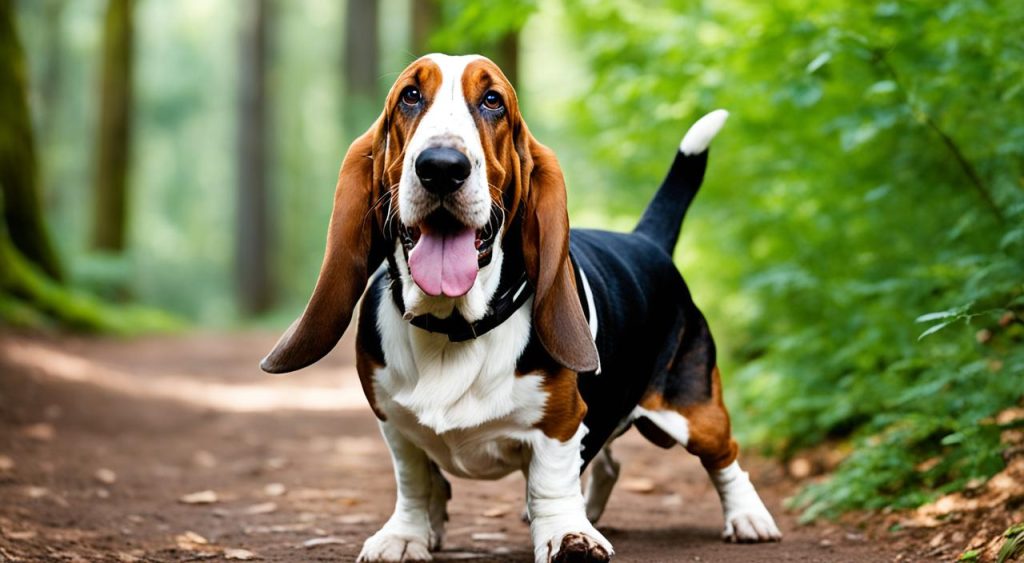Owning a Basset Hound can be a delightful experience. These dogs are known for their friendly and easygoing nature, getting along well with everyone they meet. However, it’s important to understand that Basset Hounds come with their fair share of challenges. Before bringing a Basset Hound into your home, it’s crucial to be aware of the potential drawbacks and disadvantages of owning this breed.
Basset Hounds are a heavy breed and require a moderate amount of daily exercise to stay fit and healthy. Lazy owners may find it challenging to meet their exercise needs, resulting in overweight Bassets that can suffer from health problems. Additionally, Basset Hounds have a strong hunting instinct that can make them stubborn and slow to obey commands. Their love for food and tendency to overeat can also lead to weight gain if not closely monitored.
In addition to their exercise and behavioral challenges, Basset Hounds have a few other considerations to keep in mind. They are known to bay, howl, and can be slow to housebreak. Their shedding can be heavier than expected for a short-haired dog, and they may have a distinctive hound odor. Furthermore, their unique physical characteristics, including their deformed build, long ears, and loose skin, make them prone to various chronic health problems.
It’s important to weigh these drawbacks against the many positive aspects of Basset Hound ownership. With the right training, exercise, and care, Basset Hounds can be loving and loyal companions. However, it’s crucial to understand and be prepared for the specific challenges that come with owning a Basset Hound.
Key Takeaways:
- Owning a Basset Hound requires meeting their exercise needs and monitoring their weight to prevent health issues.
- Basset Hounds have a strong hunting instinct and can be stubborn and slow to obey commands.
- They may bay, howl, and be slow to housebreak.
- Basset Hounds shed more than expected for a short-haired dog and may have a distinctive hound odor.
- They are prone to various chronic health problems due to their deformed build, long ears, and loose skin.
Challenges of Training a Basset Hound
Basset Hounds are known for their stubborn nature and independent thinking, which can make training a challenge. These dogs are not eager to please and might have a “what’s in it for me?” attitude towards obedience training. Their response to commands is often deliberate and thoughtful, rather than immediate. Basset Hounds can be slow to obey commands, requiring patience and consistency in training methods.
Despite their stubbornness, Basset Hounds can still be effectively trained with the right approach.
It’s important to use methods that incorporate praise and encouragement to motivate these dogs. Positive reinforcement techniques work best, as Basset Hounds are not responsive to harsh or forceful training methods.
Consistency is key, as these dogs thrive on routine and repetition. By establishing clear boundaries and setting expectations from an early age, you can help your Basset Hound understand what is expected of them.
H3: Understanding Their Independent Nature
Basset Hounds have an independent nature rooted in their hunting instincts. They were bred to work at their own pace, making independent decisions in the field. This independent thinking can carry over into their obedience training. It is essential to approach training sessions with patience and understanding, acknowledging that Basset Hounds might need extra time to process and respond to commands.
By investing time and effort into training your Basset Hound, you can overcome the challenges presented by their stubbornness. With consistency, positive reinforcement, and an understanding of their independent nature, you’ll be able to successfully train your Basset Hound and establish a strong bond based on trust and respect.
Exercise and Outdoor Management
Despite their low-energy appearance, Basset Hounds require regular exercise to maintain a healthy weight and prevent obesity. They were originally bred to run for miles, although their deformed structure makes excessive exercise unhealthy for them.
Regular walks and opportunities to stretch their legs in a safely enclosed area, such as a dog park, are necessary. Basset Hounds should be kept on a leash or in a fenced area when outdoors due to their strong hunting instinct and tendency to wander off when an interesting scent catches their attention.
Health Concerns
Basset Hounds are prone to various health conditions, including interveterbral disc disease, hip dysplasia, glaucoma, and gastric torsion. Regular veterinary examinations, specifically focusing on the eyes and hips, are important for early diagnosis and treatment of these common health concerns. Their deformed build, long ears, and loose skin contribute to a higher risk of bone and joint problems, ear problems, and skin diseases. Prospective Basset Hound owners should be prepared for the potential costs and care associated with managing these health issues.
Conclusion
Owning a Basset Hound can be a rewarding experience, but it is essential to be aware of the drawbacks and limitations that come with it. The breed’s stubbornness can make training a challenge, requiring patience and consistency on your part. Basset Hounds also have specific exercise needs, which should be met to keep them healthy and prevent weight gain. Outdoor management is crucial due to their strong hunting instinct and wandering tendencies. Additionally, potential health concerns associated with their deformed build require regular veterinary care and attention.
However, with proper training, exercise, and care, Basset Hounds can become loving and loyal companions. They have a friendly and sociable nature that can bring joy to your life. If you are willing to invest the time and effort into training and meeting their specific needs, owning a Basset Hound can be a fulfilling experience.
Ultimately, the decision to own a Basset Hound should be based on your individual lifestyle and commitment. Consider the challenges and responsibilities that come with owning this breed, as well as your ability to provide the necessary care and attention. If you believe you are ready and equipped to handle the cons of owning a Basset Hound, you can enjoy the unique and wonderful companionship that this breed can offer.





